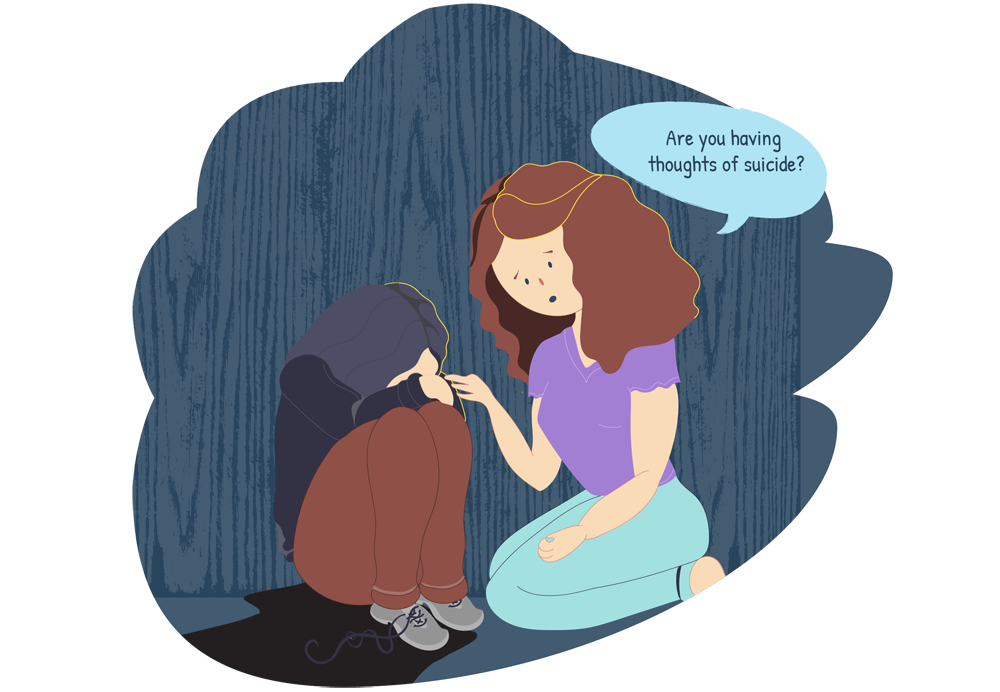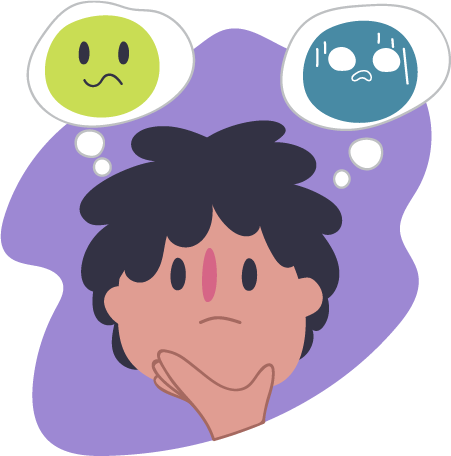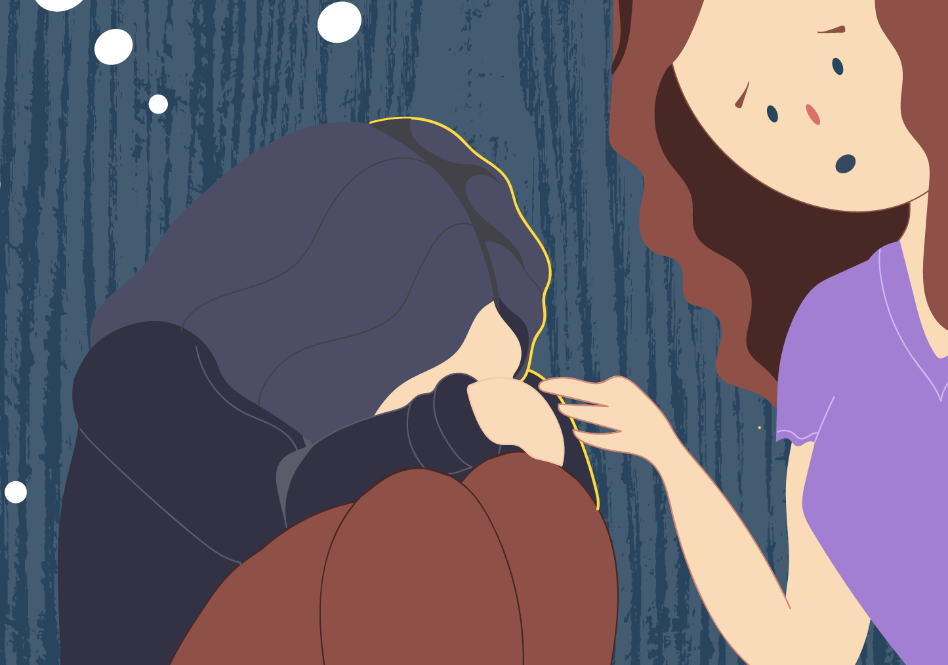Supporting a child who is thinking of suicide
As a parent, it’s frightening to hear your child talk about suicide and it can be difficult to know how to help.
Content Warning: this article contains information about mental health which may be distressing or triggering.

If your child is in immediate danger call 000 and stay with them until they are safe.
If they are having thoughts and plans of suicide, you can support them to call Kids Helpline on 1800 55 1800 to talk about this further.
Is my child at risk of suicide?
It’s so great that you’re educating yourself about youth suicide. It’s a frightening topic – but suicide can be prevented, and the best way to prevent it is by learning and communicating about it.
Suicidal thoughts and feelings can affect anyone – any age, gender, socioeconomic status, etc., at any time. Here are some suicide risk factors that could make your child more at-risk of taking their own life:
- Bullying
- Discrimination
- Suicide of someone known to your child – like a friend or peer
- A life changing event, like a breakup, job loss, or academic disappointment
- Self-harm
- Loss of a loved one
- Experiencing violence or abuse
- Discrimination, rejection or hostility due to sexual or gender identity
Warning signs that your child might be suicidal
Have you ever wondered, “How would I know if my child was at risk of killing themself?” Here are some common red flags/indicators. If you're unsure, or you have a ‘gut feeling’ something isn’t quite right, please reach out for support!
Withdrawing from others
Self-harming
Hints they're thinking about suicide such as “I’d like to go to sleep and never wake up” or "I wish I wasn't here"
Talking about feeling worthless, hopeless, alone, being a burden to others or having no reason to live
Talking about death or suicide (even in a joking way)
Dramatic changes in mood including being suddenly happy
Not doing things they used to enjoy
Giving away possessions or saying goodbye
Posting about death, dying, suicide, self-harm, ‘kms’, and ‘unalive myself’ etc., on social media
Increased drug or alcohol use or other risky behaviours
Having the means to end their life such as medication or weapons
Not attempting or doing school work because, “There’s no point”
How to support a suicidal young person
The good news is that suicide isn’t inevitable – and the best prevention is communication. If a young person is actively suicidal, talking openly and working together on the next steps really helps them to stay safe. Here’s what to say and do:
It’s ok (and encouraged) to use the word, “Suicide”. If you’re unsure, you can and should ask your child, “Are you feeling suicidal?” Using the word suicide will not ‘put ideas in their head’ - and it gives your child ‘permission’ to be open and honest about how they feel, without fearing your reaction.
Manage your own feelings. Finding out your child is suicidal is a lot – and it’s normal to feel a range of emotions. Your feelings are valid and real – and you deserve care and support too. It’s ok to take some time to process. You want to be calm and supportive in what you say and do next with your child. Your role in your child’s life is to be their parent, you are not expected to be an expert in this. You are already taking the best steps by connecting here to get more information.
Get professional support through a GP, psychologist or counsellor as soon as possible. There are 24/7 crisis services you can call also (including Kids Helpline – you can call with your child and put them on the phone, or connect via webchat)
If you think they’re unsafe, remove anything they may use to harm themselves and don’t leave them by themselves. You might create a safety plan to buy some time to get professional support, e.g. “If you think you might hurt yourself, can you tell me before doing it?”
Listen to your child without judgement. Be curious and ask open questions, e.g. “What’s been going on?”; “You’re not in trouble. Can we talk about what’s been happening for you? I’d like to understand and support you.”
Show them that you care and they're not alone with this – and that you’ll get through it together. “I’m glad you told me about this. I love you – let's talk about what to do next because you deserve to feel better.”
It’s ok if you’re not sure what to do next. Ask your child what they would like to happen and support them to explore options for professional supports and next steps. You can make a plan together.
Express your concern, e.g. “I’ve noticed you’ve seemed really down lately, and I’m worried about you.” “It seems like over the last couple of weeks that you have been really low and upset, would you be able to tell me a bit about what has been happening?”
Create a safety plan with your child
A safety plan is a preprepared guideline of things that you and your child can prepare together for your child to do to try and feel more safe.
Take the time to listen to how they are feeling and why they are feeling these ways before coming up with a safety plan. This can help your child feel heard and like you are a safe space to share, which improves safety and trust.
A good safety plan lists out things like:
- Triggers. Certain places, people, feelings, thoughts, or events can bring up the urge to end their life. Knowing the triggers can help understand things better.
- Warning signs. These are changes in how they think, feel or act that might indicate their mental health is getting worse. This could look like withdrawing from friends, having the urge to self-harm, not being able to sleep, etc.. Knowing the warning signs can help get help early.
- Ways to make the environment safe by getting rid of things they may use to harm themself. This can decrease the urges and give them space to be able to use other coping strategies and get more support.
- Distractions, delays and coping strategies that work for them. Like holding ice, playing with a pet, grounding exercises, music, movies, hanging with friends, setting 15-minute timers, etc..
- Things that are important to them. Reasons to live (e.g. pet cat, little sister, etc.), things that give them hope, and things they are looking forward to (e.g. seeing their favourite singer in concert) can help give deeper purpose to staying safe.
- Supports. Both personal (family and friends) and professional (like Kids Helpline counsellor).
Suicide don’ts
When someone feels suicidal, they are feeling intense, overwhelming negative emotions and distress – they need care and kindness, not judgement.
It’s normal to feel shocked, disbelief, anger, and a whole range of emotions when you find out your child is suicidal. It’s important to respond rather than react (which is much easier said than done!)
Don't dismiss or minimise
Dismissing (e.g. "Don't be silly - you're not suicidal!" or minimising (e.g. "Oh please, you've got a good life, you're just doing this for attention") your child's thoughts, feelings and experience can make your child shut down.
Don’t make it about you or other people
Saying things like, "How would I feel if you kill yourself?" might be well intentioned (trying and show them how much losing them would hurt you), but it won’t have the desired effect. Research has shown that when young people are distressed, it can hamper their ability to have empathy for others. When people are suicidal, they often feel like a burden, and making them feel guilty about being suicidal can even increase the chances they might try to end their life.
Don't do nothing
This is the most important don't. Don't ignore it and hope it goes away. Your child needs immediate support.
If you’ve made a mistake and reacted emotionally or said something you regret in the heat of the moment – it’s not too late to apologise to your child and respond with care and compassion. All relationships have rupture and repair – and it’s the repair that counts the most. This also shows your child that you are there for them and willing to reflect on your actions in order to best support them.
“Know that it's ok not to have all the answers: just listen, be patient, show them you care and help them get professional support.” – Samuel, 22, Kids Hepline caller
Why is my child suicidal?
Having a suicidal child is not a sign you’re a bad parent. The causes of suicidal thoughts are very personal and complex.
Children and teens who contact Kids Helpline to talk about suicide often don’t want to die – they just can’t see a way out and want to stop the emotional pain they’re experiencing. These young people often feel beyond their ability to cope.
Some young people have intrusive thoughts of suicide – which are upsetting thoughts that pop into their head at random.
There is a link between mental ill-health (especially depression) and suicide, but some people are suicidal without a mental health issue. Depression and suicidal thoughts may also be caused by, or linked with some physical health issues, such as Vitamin D deficiency, and exposure to substances or toxins (like carbon monoxide) - which is why it’s important to see a GP for depression as they are able to run tests, diagnose, treat and refer to other services.
Suicidal thoughts are very treatable and something you can recover from.

As a parent, you can be your child’s greatest source of support
How you can help your child with thoughts of suicide:
Looking after yourself
Hearing that your child is having suicidal thoughts is distressing and it's likely to have a big impact on you.
You're not expected to be their counsellor or to know exactly what to do. Reaching out for professional support is important for your wellbeing and the wellbeing of your child.
Here are some more counselling and crisis support options:
Call Kids Helpline on 1800 55 1800 (for young people up to the age of 25)
Call the Suicide Call Back Service on 1300 659 467 (for people over the age of 15)
Make an appointment to see a GP, psychologist or counsellor
Give Parentline a call in your local State or Territory - you deserve support too! Parentline (State or Territory dependent) may even be able to offer you further strategies and ideas on how to support your young person.
Find more digital services and resources at Head to Health
Looking to learn more about teen suicide? We have some great articles for teens which answer commonly asked questions about suicide, give tips around making a safety plan, and debunk myths around suicide.
Check these out too:
My child struggles with mental health
It's hard to know how to help your child when they're having ...
READ MEDepression in kids and teens
You might be unsure whether your child is just sad or if ...
READ MEHow Kids Helpline can help your child
Curious about what Kids Helpline does and how it can help? We’...
READ MEHow Parentline can help you
Parenting can be a tough job but also really rewarding. Talking to ...
READ METalking helps! We’re here for your kids.
No problem is too big or too small.
We're here 24 hours a day, 7 days a week






